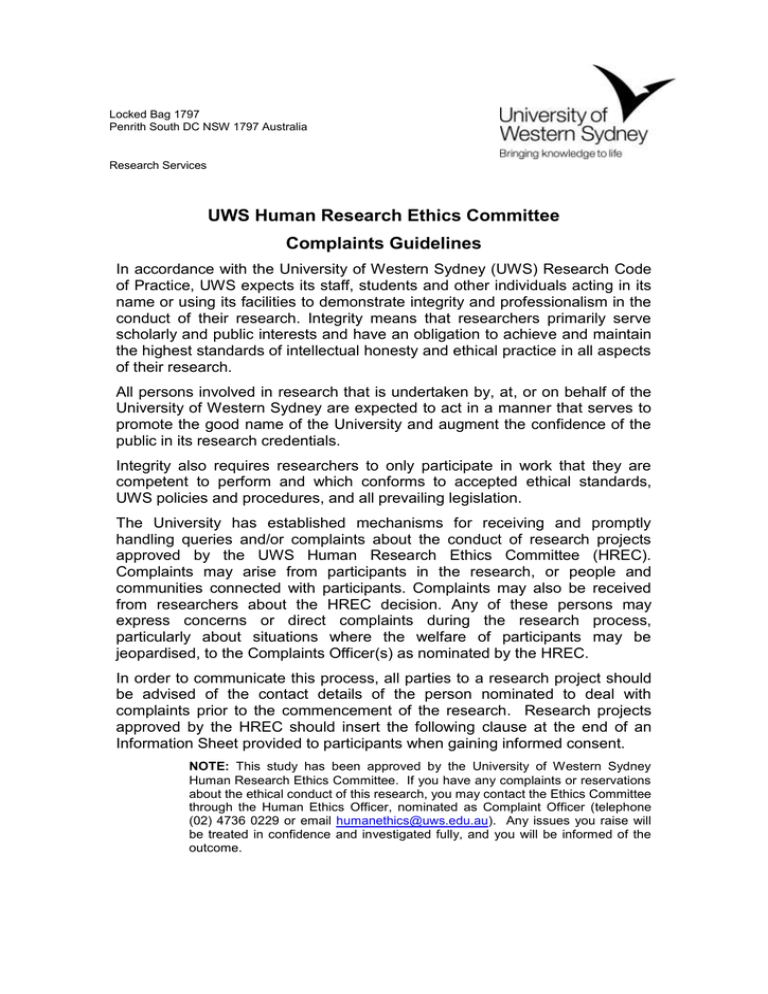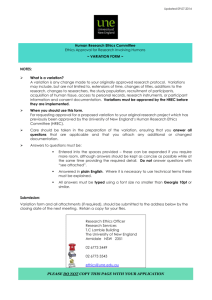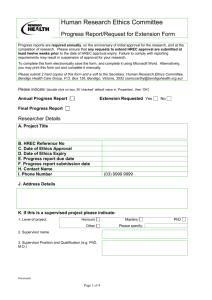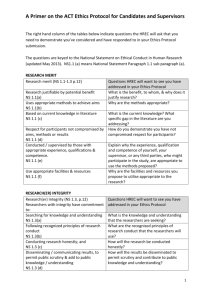UWS Human Research Ethics Committee Complaints Guidelines
advertisement

Locked Bag 1797 Penrith South DC NSW 1797 Australia Research Services UWS Human Research Ethics Committee Complaints Guidelines In accordance with the University of Western Sydney (UWS) Research Code of Practice, UWS expects its staff, students and other individuals acting in its name or using its facilities to demonstrate integrity and professionalism in the conduct of their research. Integrity means that researchers primarily serve scholarly and public interests and have an obligation to achieve and maintain the highest standards of intellectual honesty and ethical practice in all aspects of their research. All persons involved in research that is undertaken by, at, or on behalf of the University of Western Sydney are expected to act in a manner that serves to promote the good name of the University and augment the confidence of the public in its research credentials. Integrity also requires researchers to only participate in work that they are competent to perform and which conforms to accepted ethical standards, UWS policies and procedures, and all prevailing legislation. The University has established mechanisms for receiving and promptly handling queries and/or complaints about the conduct of research projects approved by the UWS Human Research Ethics Committee (HREC). Complaints may arise from participants in the research, or people and communities connected with participants. Complaints may also be received from researchers about the HREC decision. Any of these persons may express concerns or direct complaints during the research process, particularly about situations where the welfare of participants may be jeopardised, to the Complaints Officer(s) as nominated by the HREC. In order to communicate this process, all parties to a research project should be advised of the contact details of the person nominated to deal with complaints prior to the commencement of the research. Research projects approved by the HREC should insert the following clause at the end of an Information Sheet provided to participants when gaining informed consent. NOTE: This study has been approved by the University of Western Sydney Human Research Ethics Committee. If you have any complaints or reservations about the ethical conduct of this research, you may contact the Ethics Committee through the Human Ethics Officer, nominated as Complaint Officer (telephone (02) 4736 0229 or email humanethics@uws.edu.au). Any issues you raise will be treated in confidence and investigated fully, and you will be informed of the outcome. SECTION A Complaints from participants in or persons otherwise connected with research 1) The Complaint Officer(s) on receipt of a complaint will: a) Make a clear and full written record of the complaint; b) Inform the Manager, Research Quality, Policy and Planning of the receipt of a complaint. c) Seek further information from all relevant parties with a view to resolving the matter. 2) All efforts will be made to seek a resolution to the complaint to the satisfaction of the complainant with minimum distress to the complainant and without unnecessarily jeopardising the research project. 3) Where resolution has not been achieved, the Complaints Officer will convene a meeting of the HREC or refer the matter to the HREC Chairperson, who has been delegated the authority to deal with such matters. 4) The HREC or HREC Chairperson will: a) Seek further information from all relevant parties as necessary, and ensure that no conflict of interest is evident. b) In writing, invite the researcher(s) to recommend a resolution to the complaint in a manner that is in the best interests of the complainant. Researchers may elect to respond in writing or in person, and must do so within 10 days. 5) When responding in person, researchers should be advised that they may be accompanied by a support person. This may be a fellow researcher, another member of staff, or a friend or family member but may not be a person who is a currently practising solicitor or barrister. 6) The Complaints Officer(s) will take a record of any meeting called to discuss the complaint and its recommended resolution. 7) The HREC Chairperson will communicate the recommended resolution to the complainant. This outcome may result in confirmation, amendment or withdrawal of the approval protocol for the project. a) Where the HREC requires amendments to the original research proposal or to the conduct of the research these will be finalised in a timely fashion by the researchers. b) Withdrawal of the approval protocol must be recommended by the HREC Chairperson and endorsed by the Pro-Vice Chancellor (Research), on behalf of the Vice-Chancellor. c) Withdrawal of the approval protocol will necessitate stopping the project (where this does not cause harm or undue distress to any participant). d) On behalf of HREC Chairperson, the Complaints Officer(s) will communicate the outcome of any meeting called to discuss the complaint to both complainant and researchers within 5 working days of the meeting. 6. If the complaint remains unresolved the HREC Chairperson will: a) Advise the Pro Vice Chancellor (Research) and, where a research student is the researcher, the Dean of Research Studies. b) The PVC (Research) and/or the Dean of Research Studies may refer the matter to the Chair of the Integrity in Research Committee for advice and resolution. SECTION B Appeals against HREC decisions 1) If researchers (staff or students) have a concern about decisions made by the University Human Research Ethics Committee in relation to a research project (excluding decisions resulting from participant complaints), they should contact the Human Ethics Officer. Upon receipt of a complaint, the Human Ethics Officer will: a) Provide the complainant (verbally or in writing, as required) with reasons for the decision with a view to resolving the appeal. b) Inform the Manager, Research Quality, Policy and Planning of the receipt of a complaint. 2) If the appeal cannot be resolved, it will be referred to the HREC Chairperson, who has been delegated the authority to deal with such matters. 3) If the matter is not resolved to the satisfaction of the researchers, they should be advised that they and/or the HREC may contact the Australian Health Ethics Committee for advice on interpreting NHMRC Guidelines in order to reach an appropriate decision or to help a complainant understand the reasons for the Committee’s decision. Professor Christine Halse (Chair, UWS Human Research Ethics Committee) Issued: 2 June 2008



